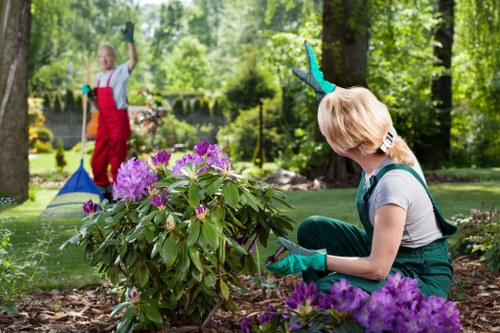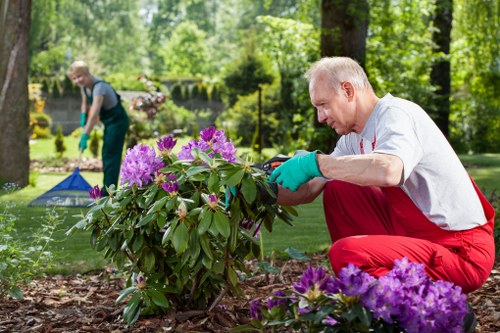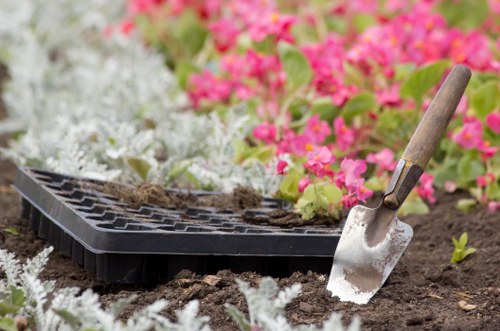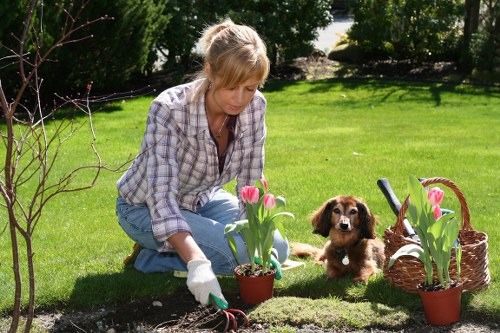Lawn Mowing Temple: Your Ultimate Guide to a Pristine Lawn

Maintaining a beautiful lawn requires dedication, the right tools, and expert knowledge. In Temple, achieving a lush, green lawn is not just about mowing the grass; it's about understanding the unique climate, soil conditions, and the best practices that ensure your lawn thrives year-round.
Whether you're a homeowner looking to enhance your curb appeal or a business owner aiming to create an inviting exterior, Lawn Mowing Temple is your go-to resource. This comprehensive guide will walk you through everything you need to know about lawn care in Temple, helping you cultivate a landscape that stands out.
From selecting the right type of grass to implementing effective mowing techniques, our goal is to provide you with actionable tips and insights that make lawn maintenance a breeze. Let's dive into the essentials of maintaining a healthy and vibrant lawn in Temple.
Understanding the Climate of Temple

Temple experiences a humid subtropical climate, characterized by hot summers and mild winters. This climate plays a significant role in determining the types of grass that thrive in the area and the best times for lawn care activities.
The hot summers in Temple mean that lawns need to be resilient and capable of withstanding high temperatures and occasional droughts. On the other hand, the mild winters allow for a prolonged growing season, giving homeowners ample time to maintain and improve their lawns.
Understanding these climatic conditions is crucial for selecting the right grass varieties and scheduling maintenance tasks effectively.
Best Grass Types for Temple Lawns

Choosing the right type of grass is the foundation of a healthy lawn. In Temple, the following grass types are highly recommended due to their adaptability and resilience:
- Bermuda Grass: Ideal for high-traffic areas, Bermuda grass is drought-resistant and thrives in the warm climate of Temple.
- Zoysia Grass: Known for its dense growth, Zoysia grass is excellent for reducing weed growth and maintaining a uniform appearance.
- St. Augustine Grass: This grass type excels in shady areas and is known for its lush, dark green color.
- Fescue: A cool-season grass that adds versatility to lawns, especially in areas with partial shade.
Each grass type has its unique benefits, and selecting the right one depends on your specific lawn conditions and maintenance preferences.
Essential Lawn Care Practices

Maintaining a pristine lawn involves a combination of regular maintenance activities. Here are the essential practices every Temple lawn owner should follow:
- Regular Mowing: Mowing your lawn regularly keeps the grass healthy and prevents overgrowth. It's recommended to mow once a week during the growing season.
- Proper Watering: Deep and infrequent watering encourages deep root growth. Aim for about one inch of water per week, adjusting based on weather conditions.
- Fertilization: Applying the right fertilizers at the right times ensures your lawn receives the necessary nutrients. Typically, fertilize in the spring and fall.
- Weed Control: Regularly removing weeds prevents them from competing with your grass for nutrients and water.
- Aeration: Aerating your lawn annually helps improve soil health by allowing better air, water, and nutrient penetration.
Implementing these practices consistently will significantly enhance the health and appearance of your lawn.
Seasonal Lawn Care Tips

Different seasons require different lawn care approaches to ensure your grass remains healthy throughout the year.
Spring
In spring, focus on removing any debris, aerating the soil, and applying a balanced fertilizer to promote new growth.
Summer
During the hot months, prioritize deep watering, mow at a higher height to provide shade to the roots, and control pests effectively.
Fall
Fall is the ideal time for overseeding, fertilizing, and preparing your lawn for the cooler months ahead.
Winter
Although Temple experiences mild winters, it's essential to minimize foot traffic on dormant lawns and prepare your grass for the next growing season.
Choosing the Right Lawn Mowing Service in Temple

Selecting a professional lawn mowing service can save you time and ensure your lawn receives expert care. Here are some factors to consider when choosing a service in Temple:
- Experience: Look for companies with a proven track record and positive customer reviews.
- Services Offered: Ensure the service provider offers comprehensive lawn care, including mowing, trimming, fertilizing, and pest control.
- Pricing: Compare pricing structures to find a service that fits your budget without compromising on quality.
- Customer Support: Choose a company that offers excellent customer service and is responsive to your needs.
- Eco-Friendly Practices: If sustainability is important to you, look for services that use environmentally friendly products and practices.
By considering these factors, you can select a lawn mowing service that aligns with your expectations and lawn care goals.
DIY vs. Professional Lawn Care

Deciding between DIY lawn care and hiring a professional service depends on various factors, including your budget, time availability, and expertise.
- DIY Lawn Care: Provides more control over the maintenance process and can be cost-effective. However, it requires time, effort, and some level of expertise.
- Professional Lawn Care: Offers convenience, expertise, and comprehensive services. It's ideal for those who prefer to outsource lawn maintenance or lack the time to handle it themselves.
Evaluate your personal circumstances to determine which option best suits your needs.
Tools and Equipment for Lawn Mowing

Having the right tools and equipment is essential for efficient and effective lawn mowing. Here are the must-have items for any lawn care toolkit:
- Quality Lawn Mower: Whether it's a push mower, riding mower, or a robotic mower, choose one that fits your lawn size and type.
- String Trimmer: For edging and trimming around obstacles where the mower can't reach.
- Leaf Blower: Helps in clearing grass clippings and leaves for a neat appearance.
- Rakes: Essential for gathering leaves, grass clippings, and other debris.
- Gardening Gloves: Protect your hands from dirt, thorns, and potential injuries.
- Safety Gear: Includes goggles, ear protection, and sturdy footwear to ensure safe mowing.
Investing in high-quality tools ensures that lawn mowing is efficient and less labor-intensive, leading to a healthier lawn.
Maintenance of Lawn Mowing Equipment

Proper maintenance of your lawn mowing equipment extends their lifespan and ensures optimal performance. Follow these tips to keep your tools in top condition:
- Regular Cleaning: Remove grass clippings and debris after each use to prevent buildup and corrosion.
- Sharpen Blades: Keep mower blades sharp for clean cuts, which promote healthy grass growth.
- Check and Replace Parts: Regularly inspect your equipment for any damaged or worn-out parts and replace them as needed.
- Proper Storage: Store your tools in a dry, sheltered area to protect them from the elements.
- Routine Servicing: Schedule professional maintenance at least once a year to ensure everything is functioning correctly.
By maintaining your equipment regularly, you ensure that your lawn mowing tasks are efficient and your tools last longer.
Sustainable Lawn Mowing Practices

Adopting sustainable lawn mowing practices not only benefits the environment but also contributes to a healthier lawn. Here are some eco-friendly tips:
- Mow with Sharp Blades: Sharp blades make cleaner cuts, reducing stress on the grass and promoting growth.
- Leave Grass Clippings: Leaving clippings on the lawn acts as natural fertilizer, returning nutrients to the soil.
- Reduce Mowing Frequency: Allowing the grass to grow slightly longer can improve its resilience and reduce the need for frequent mowing.
- Use Electric or Manual Mowers: These options produce fewer emissions compared to gas-powered mowers, making them more environmentally friendly.
- Water Wisely: Watering early in the morning minimizes evaporation and ensures that the grass receives adequate moisture.
Implementing these practices helps in creating a sustainable and vibrant lawn while minimizing environmental impact.
The Benefits of Sustainable Lawn Care
Sustainable lawn care offers numerous benefits, including:
- Environmental Protection: Reduces water usage, lowers carbon emissions, and minimizes the use of harmful chemicals.
- Cost Savings: Eco-friendly practices often lead to lower utility bills and reduced maintenance costs.
- Healthier Lawn: Sustainable methods promote robust grass growth and resilience against pests and diseases.
- Enhanced Biodiversity: Encourages a variety of plant and animal life, contributing to a balanced ecosystem.
Adopting sustainable practices not only benefits your lawn but also the broader environment, creating a positive impact for future generations.
Local Relevance: Nearby Areas to Temple
Temple's vibrant community extends to its surrounding areas, each offering unique features that complement Lawn Mowing Temple's services. Here are some of the closest areas to Temple where residents can benefit from expert lawn care:
- Waco: Just 25 miles north, Waco offers a blend of urban and suburban living, with lawns that require meticulous care to match the city's aesthetic.
- Killeen: Located 30 miles west, Killeen's expansive properties benefit from professional mowing services that maintain large lawns efficiently.
- Belton: 20 miles southeast, Belton's community parks and residential areas thrive with well-maintained lawns provided by local experts.
- Nash: Situated 10 miles northeast, Nash homes appreciate the quick and reliable lawn care services that fit their busy lifestyles.
- Heath: 15 miles south, Heath's picturesque neighborhoods require specialized lawn care to preserve their beauty.
- Copperas Cove: 35 miles southwest, Copperas Cove's expansive yards are perfectly catered to by Lawn Mowing Temple's comprehensive services.
- Harker Heights: 40 miles west, Harker Heights benefits from sustainable lawn care practices that align with the community's values.
- Rockdale: 50 miles northeast, Rockdale's diverse landscapes require versatile lawn mowing solutions.
- Heath Everbitt: An area within Heath, offering unique lawn care needs that Lawn Mowing Temple is equipped to handle.
- Hillwood: 45 miles southeast, Hillwood's lush environments benefit from expert lawn maintenance services.
- Blanco: 55 miles south, Blanco residents enjoy pristine lawns with the help of professional mowing services.
- Fort Hood: Nearby military installation where Lawn Mowing Temple provides efficient lawn care for both residential and community areas.
- Lakeland: 60 miles northwest, Lakeland's sprawling estates require comprehensive lawn care solutions offered by Lawn Mowing Temple.
- Edna: 65 miles east, Edna's smaller lawns benefit from personalized care plans tailored by Lawn Mowing Temple.
- Killeen Gardens: A subdivision in Killeen, offering specialized lawn maintenance services to match the community's standards.
Conclusion
Achieving and maintaining a beautiful lawn in Temple is entirely possible with the right knowledge, tools, and support. Whether you choose to handle lawn care yourself or enlist the help of professionals like Lawn Mowing Temple, the key is consistency and understanding your lawn's specific needs.
By following the practices outlined in this guide, you can ensure that your lawn remains healthy, vibrant, and the envy of your neighborhood. Embrace sustainable methods, invest in quality equipment or services, and watch your Temple lawn flourish.
For personalized lawn care solutions and expert advice, reach out to Lawn Mowing Temple today and take the first step towards a greener, more beautiful outdoor space.
Frequently Asked Questions
1. How often should I mow my lawn in Temple?
It's recommended to mow your lawn once a week during the growing season. However, the frequency may vary based on grass type and growth rate.
2. What is the best time of day to water my lawn?
The best time to water your lawn is early in the morning, ideally before sunrise. This minimizes evaporation and allows grass to absorb moisture effectively.
3. How can I prevent weeds from taking over my lawn?
Regular mowing, proper fertilization, and watering practices help maintain a dense lawn that resists weed invasion. Additionally, using pre-emergent herbicides can prevent weed seeds from germinating.
4. Should I fertilize my lawn myself or hire a professional?
Both options are viable. DIY fertilization allows for more control, while hiring a professional ensures accurate application and tailored nutrient solutions based on your lawn's needs.
5. What are the signs that my lawn needs aeration?
Signs include compacted soil, poor drainage, thin grass, and the presence of thatch buildup. Aerating your lawn can alleviate these issues by improving soil health and root development.